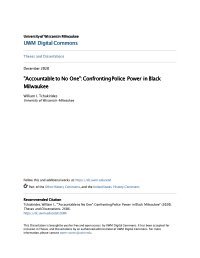"Accountable to No One": Confronting Police Power in Black Milwaukee
By William I. Tchakirides
This dissertation uncovers the roots of discriminatory police power in Milwaukee, Wisconsin and traces Black-led efforts to make the city’s police bureaucracy more accountable to all citizens. It analyzes the politics of police reform in the century spanning the passage of two state laws that reconfigured Milwaukee’s law enforcement arrangements. The first (1885) removed City Hall’s managerial control over the Milwaukee Police Department (MPD). Corporate elites and social reformers fearful of rising working-class power and moral degeneration in the immigrant-industrial city lobbied for the statute’s enactment. The second (1984) reversed course, re-empowering nonpolice officials after decades of Black-led campaigns for diverse input, representation, and oversight within Milwaukee’s white-controlled police bureaucracy. While the 1885 law created a civil service commission to regulate public safety hiring free of political machine influence, it also gave exclusive accountability to property-holders and shielded department heads from external supervision— provisions later targeted by activists. A revision (1911) clarified the power of the city’s public safety chiefs, granting them indefinite tenure, policymaking authority, and institutional autonomy. In turn, the MPD fostered an outwardly exceptional status at the height of policing’s “reform era” (1920s-1950s). This apparent exceptionalism, marked by a value-neutral self-image, was established around administrative innovations and crime control efficiencies heralded by national policing experts. It was a dynamic that broadly served white middle-class and corporate interests, as...
Milwaukee: University of Wisconsin - Milwaukee, 2020. 517p.


